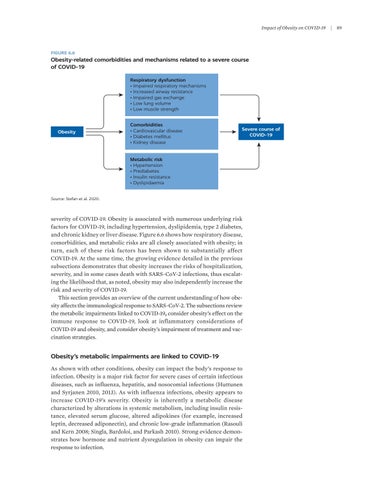Impact of Obesity on COVID-19
FIGURE 6.6
Obesity-related comorbidities and mechanisms related to a severe course of COVID-19 Respiratory dysfunction • Impaired respiratory mechanisms • Increased airway resistance • Impaired gas exchange • Low lung volume • Low muscle strength
Obesity
Comorbidities • Cardiovascular disease • Diabetes mellitus • Kidney disease
Severe course of COVID-19
Metabolic risk • Hypertension • Prediabetes • Insulin resistance • Dyslipidaemia Source: Stefan et al. 2020.
severity of COVID-19. Obesity is associated with numerous underlying risk factors for COVID-19, including hypertension, dyslipidemia, type 2 diabetes, and chronic kidney or liver disease. Figure 6.6 shows how respiratory d isease, comorbidities, and metabolic risks are all closely associated with obesity; in turn, each of these risk factors has been shown to substantially affect COVID-19. At the same time, the growing evidence detailed in the previous subsections demonstrates that obesity increases the risks of hospitalization, severity, and in some cases death with SARS-CoV-2 infections, thus escalating the likelihood that, as noted, obesity may also independently increase the risk and severity of COVID-19. This section provides an overview of the current understanding of how obesity affects the immunological response to SARS-CoV-2. The subsections review the metabolic impairments linked to COVID-19, consider obesity’s effect on the immune response to COVID-19, look at inflammatory considerations of COVID-19 and obesity, and consider obesity’s impairment of treatment and vaccination strategies.
Obesity’s metabolic impairments are linked to COVID-19 As shown with other conditions, obesity can impact the body’s response to infection. Obesity is a major risk factor for severe cases of certain infectious diseases, such as influenza, hepatitis, and nosocomial infections (Huttunen and Syrjanen 2010, 2013). As with influenza infections, obesity appears to increase COVID-19’s severity. Obesity is inherently a metabolic disease characterized by alterations in systemic metabolism, including insulin resistance, e levated serum glucose, altered adipokines (for example, increased leptin, decreased adiponectin), and chronic low-grade inflammation (Rasouli and Kern 2008; Singla, Bardoloi, and Parkash 2010). Strong evidence demonstrates how hormone and nutrient dysregulation in obesity can impair the response to infection.
|
89






